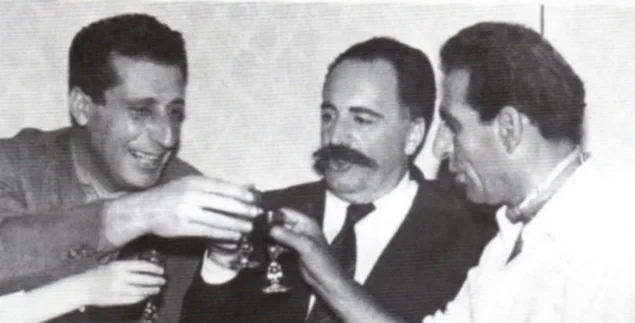William Saroyan founded the William Saroyan Foundation as Steward of his Legacy
On December 30, 1966, William Saroyan founded the William Saroyan Foundation. The initial signatories to the Articles of Incorporation and subsequent officers and directors were William Saroyan, his brother Henry, and sister Cosette.
The Foundation’s first order of business was the following resolution:
“By unanimous vote, [the] Deed of Trust was accepted from William Saroyan of a manuscript of ‘The Time of Your Life’ and of sixteen short stories, to be made available for literary and educational use by the public.”
2016 marked the Foundation’s 50th year.
When Saroyan died in 1981, he bequeathed his vast literary estate to the Foundation, and bestowed leadership of the Foundation to Robert Setrakian, a close friend of many years and the executor of Saroyan’s will. Under Mr. Setrakian’s guidance, the Foundation organized and compiled Saroyan’s work – a major undertaking that required collecting, collating, and codifying published and unpublished works in Paris, San Francisco, Fresno, Berkeley, and Malibu.
For the next 15 years, the Foundation managed the literary estate itself and in so doing, negotiated over 600 permission grants and publications of Mr. Saroyan’s novels, short stories, plays, musicals, songs, and opera; in book form as well as for production on stage, screen, radio, and television. Saroyan’s work is enjoyed and produced in scores of countries around the world. Mr. Setrakian also edited and published Mr. Saroyan’s last manuscript, Where the Bones Go.
The Foundation brought together a wide variety of leaders in the arts, education and business onto its Board of Trustees, including: Dickran Kouymjian, professor, Fresno State University; Dr. Harold Haak, president, California State University, Fresno; William Abrahams, author, executor of the Lillian Hellman Estate; James D. Hart, Executive Director, Bancroft Library, University of California, Berkeley; Daniel Dibert, attorney; Andrew Jameson, former Vice Chancellor, University of California, Berkeley; Leon S. Peters, business executive; and Anthony M. Frank, United States Postmaster General, Retired.
In 1997, the Board decided that Mr. Saroyan’s expressed interests regarding the stewardship of his literary estate were best served by bringing the entire collection of written works – published and unpublished, stories, essays, autobiography, diaries, novels, plays, letters – together in one place, to make the entire collection accessible to biographers, scholars, researchers, and students. After consultation with and consideration of a wide variety of alternatives, the Board ultimately placed all of Saroyan’s literary papers in Special Collections at Stanford University Libraries, now designated the William Saroyan Archive. Stanford has done an outstanding job protecting, supporting, and advancing Saroyan’s literary legacy.



